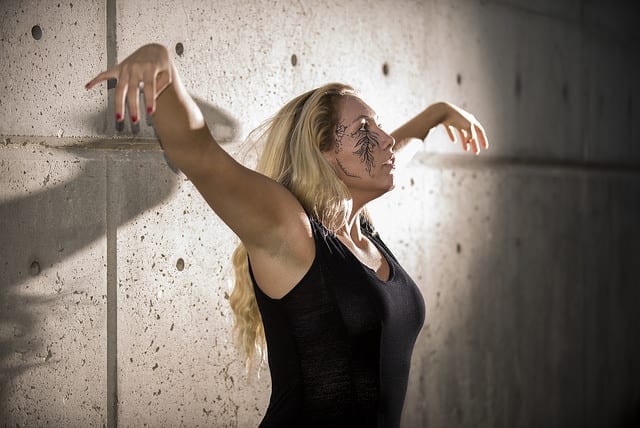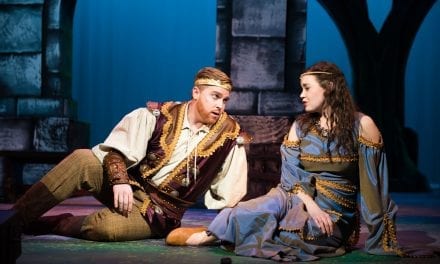MIDVALE — Soon after its 1990 premiere at Dublin’s Abbey stage, Dancing at Lughnasa took London and New York by storm, winning both Olivier and Tony best-play honors. It went on to became one of the most successful and universally acclaimed plays of the decade and is hailed as playwright Brian Friel’s masterpiece. The Pinnacle Acting Company’s revival is a plainly modest but compelling production of the complex play, and the company should be applauded for tackling the challenge. The strength of Friel’s play is intact, and the seasoned actors have a heartfelt passion for the roles and deliver captivating performances.
Lughnasa is a tender memory play based on the lives of Friel’s own mother and aunts with the central character born the same year as Friel himself. The story takes place in the confined kitchen of the five Mundy sisters who are making the best their days in rural Ireland. But life is “changing too quickly before my eyes,” recalls Michael, only seven at the time, but cleverly narrated by him later in his adult life. “There is a widening breach between what seemed to be and what was, of things . . . becoming what they ought not to be.”
The sisters are unmarried and in their thirties, in an era when women married young. The only men in the house are their recently returned elder brother, Father Jack, and our narrator Michael, the illegitimate son of the youngest sister. Making visits to the home is Michael’s long-absent father Gerry. The first and second acts transpire over single days during the Festival of Lughnasa (pronounced loo-na-sa), a celebration of the harvest. At one point the sisters loose themselves in vibrant dance, finding joy remembering their younger selves, until abruptly the music stops. This is just one of the metaphors of what lies ahead: the poignant breakup of this once close-knit family and provides a deeply felt commentary on the social and cultural circumstances of 1930’s Ireland.
This is not a plot play; it is a character play. The story is not filled with spectacle or suspense, and all of the activity takes place in a single room or just outside it. The actors’ individual characters and their relationships must carry the play. This presents a tricky task for the director of Lughnasa to weave together the strong and genuine characters and balance each of characters’ intertwined relationships. While the production intrigues and there is no difficulty in maintaining our attention, director John Graham struggles with the almost impossible level of ensemble coordination needed in order to allow the mystifying power of Lughnasa to become fully realized.
Playing the religiously fervent sister Kate, who attempts to keep the household in order, is Carrie Morgan. When her younger sisters propose attending the harvest festival, Kate vetoes the idea, saying “Dancing at our time of day? That’s for young people with no duties and no responsibilities.” Her character could easily become something of an unsympathetic villain, but Morgan finds the complexity in the character and performs her role with grace. The love-stricken Chris is played by Melanie Nelson who captures the character’s illusory hopes as she yearns to believe in the charming lies of her son’s father. Nelson manages to keep the audience spellbound in her conversations with a child that isn’t actually there and sparkles when on stage with her feckless suitor.
Alexandra Harbold brings an impish disposition to the part of Maggie, who challenges Michael to solve her endless riddles. She is the family eccentric and has lingering regrets. Harbold’s Maggie has an honest nature but also a quick wit. Cassandra Laine is wonderful as Rose. Rose has a vibrant heart to go along with her child’s mind, and Laine brings a lovely dignity to the role that resonates with the audience. The repressed Agnes who spends her days knitting gloves is played by Tamari Dunbar. While her character could easily be overshadowed by her more boisterous sisters, Dunbar is touching, particularly while serving as Rose’s protector.
The pitch-perfect performance of Jon McBride provides a warm but unsentimental narrative, and Friel’s prose receives a full measure of eloquence. The actor’s only real interactions are with the audience; he delivers his lines distanced from the on-stage action. McBride is a compelling force that draws us into his role as both our narrator and the doted-on child—and McBride deftly balances the two responsibilities.
Gerry—played by Jared Larkin—is the most difficult role to pull off. Larkin’s skill as an actor is clear, and in his hands the philanderer nearly becomes a sympathetic character. But the portrayal lacks the character’s glib self-deception. We should be aware that Gerry isn’t truthful, but we’re overtaken by his charm and how the women are seduced by his dancing. A fair amount of much-needed humor should be found in Father Jack (Jim Dale), who was sent home from a Uganda leper colony as his mental health breaks down. Dale is convincing as the fumbling man who is unable to regain his previous life, but the comedy of the Father Jack character as written is surprisingly lost. Each of the other actors’ authentic-sounding accents is convincing—and more importantly, despite the Irish brogue, the lines are well-spoken and clearly understood. But we hear a decidedly at-odds English accent in Dale’s Father Jack.
The winning, appropriately incorporated choreography is by Paul Winkelman. Jared Larkin is credited with the farmhouse kitchen set design. The small stage works well for the single set, and the actors maneuver the tight quarters well. The budget constraint is most noticed in the costuming; ingenuity is evident but unity and period accuracy is lacking. The company’s performing space is Midvale’s Old City Hall, which is an auditorium with a stage, and the audience’s sightlines are unquestionably awkward. With limited technical resources, effective stage lighting to heighten the drama is not available.
Despite its limitations, Lughnasa has a magical fascination and should be sought out. Audiences will fall in love with this family, and the memory of the Mundys will linger after the performances end. It is a pleasure to see this play come to life.





